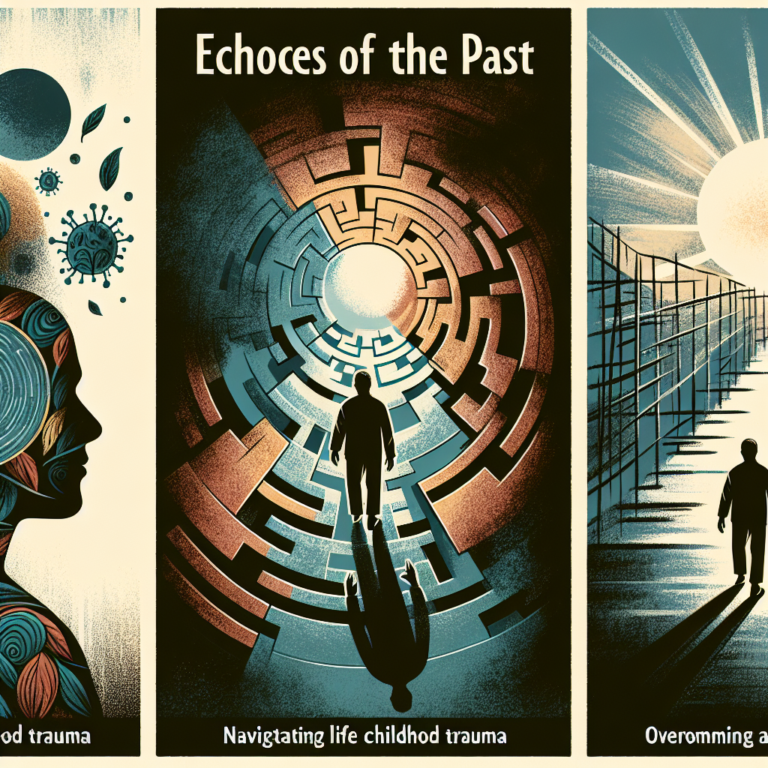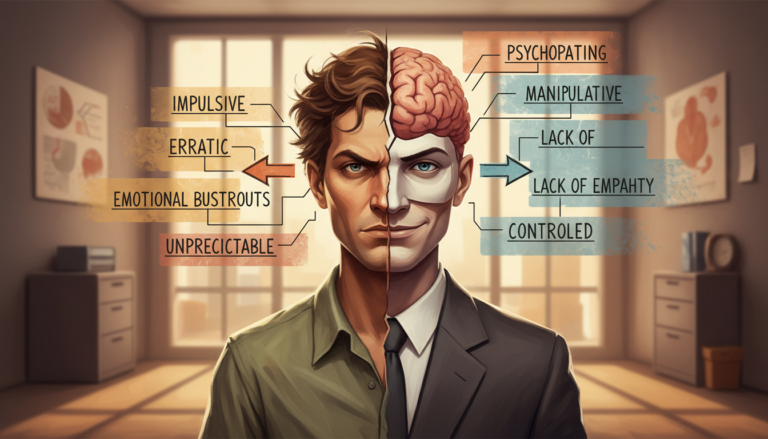
Empowering Yourself: The Ultimate Guide to Identify and Manage Symptoms of Bipolar Disorder
Introduction: Embracing Your Journey
Bipolar disorder can be an overwhelming condition to navigate, marked by drastic mood shifts, energy fluctuations, and challenges that can significantly impact one’s daily life. However, understanding and managing its symptoms can profoundly change how individuals live. Empowering yourself begins with awareness and education. In this article, we will explore the essentials of identifying and managing the symptoms of bipolar disorder, equipping you with tools to take charge of your mental health journey.
Understanding Bipolar Disorder: What You Need to Know
What is Bipolar Disorder?
Bipolar disorder, previously known as manic-depressive illness, is a mental health condition characterized by extreme mood changes. The shifts between manic episodes (high energy and euphoria) and depressive episodes (deep sadness and lethargy) can be abrupt and often lead individuals to feel out of control.
Types of Bipolar Disorder
- Bipolar I Disorder: This type is defined by manic episodes lasting at least seven days, or by manic symptoms that are so severe that immediate hospital care is needed. Depressive episodes may also occur and last at least two weeks.
- Bipolar II Disorder: This form is characterized by a pattern of depressive episodes and hypomanic episodes but not the full-blown manic episodes defined in Bipolar I.
- Cyclothymic Disorder (Cyclothymia): This is a milder form of bipolar disorder with periods of hypomania and periods of depressive symptoms lasting for at least two years (one year in children and adolescents).
The Importance of Identification
Identifying symptoms early can lead to more effective management, thus preserving relationships, employment, and overall quality of life. The key to empowerment is understanding your unique experiences and recognizing patterns in your moods.
Empowering Yourself: How to Identify Symptoms of Bipolar Disorder
Recognizing Symptoms: The Key Indicators
Understanding the signs of bipolar disorder is crucial in the journey of empowerment. Here are the primary symptoms to watch for:
| Symptoms | Manic Phase | Depressive Phase |
|---|---|---|
| Mood | Elevated, euphoric, or irritable | Sadness, hopelessness, or loss of interest |
| Energy | Increased energy, hyperactivity | Fatigue or lack of energy |
| Sleep | Decreased need for sleep | Sleeping too much or insomnia |
| Thinking | Racing thoughts, distractibility | Difficulty concentrating, indecisiveness |
| Behavior | Engaging in risky behaviors, excessive spending | Withdrawal from social activities |
| Self-Esteem | Inflated self-esteem | Low self-esteem, feelings of worthlessness |
Personal Case Study: Adam’s Journey
Adam, a 29-year-old graphic designer, was diagnosed with Bipolar I disorder after experiencing significant mood shifts for several years. He initially struggled with identifying his symptoms, often attributing them to stress or personality traits. After a particularly manic episode led to impulsive spending and conflicts with friends, Adam sought help. Through therapy and careful tracking of his moods in a journal, he was able to identify his triggers and emotions more clearly. Adam’s story illustrates that recognizing patterns in mood changes is a vital step in self-empowerment.
Utilizing Tools for Identification
Modern technology offers several tools to help individuals manage their bipolar disorder effectively:
- Mood Tracking Apps: Applications like Moodpath and Daylio allow users to log their mood and share the data with healthcare providers for tailored treatment plans.
- Journaling: Writing daily entries can help recognize patterns in feelings and behaviors, fostering self-awareness.
- Support Groups: Engaging with support groups can provide social reinforcement and validation, making it easier to discuss symptoms with others who understand.
Empowering Yourself: Strategies to Manage Symptoms
Professional Help: The Role of Mental Health Experts
One of the most empowering steps you can take is to build a support system that includes mental health professionals. Here are the essential components of effective treatment for bipolar disorder:
- Psychotherapy: Cognitive Behavioral Therapy (CBT) can help individuals challenge negative thoughts and behaviors, develop coping strategies, and manage stress.
- Medication: Mood stabilizers and antipsychotic medications play a significant role in managing symptoms, often helping to prevent the severity of mood swings.
- Regular Check-ups: Routine appointments with a psychiatrist can ensure medication effectiveness and allow for timely adjustments.
Lifestyle Adjustments: Simple Changes for Big Impact
Integrating healthy habits into your routine can facilitate mood stabilization:
Regular Exercise: Physical activity has been shown to reduce symptoms of depression and anxiety. Aim for at least 30 minutes of moderate exercise most days.
Balanced Nutrition: A diet rich in omega-3 fatty acids, vitamins, and minerals can contribute to overall mental wellness.
Establishing a Sleep Routine: Consistency in sleep can significantly impact mood stability. Aim for 7-9 hours of quality sleep each night.
- Mindfulness and Meditation: Practicing mindfulness techniques can help rewire your brain to respond more positively during mood changes.
Personal Case Study: Linda’s Effective Management
Linda, a 35-year-old teacher, embraced a holistic approach to manage her bipolar II disorder. After consulting with her therapist, she implemented lifestyle changes, focusing on exercise, structured sleep, and a balanced diet. She reported significant decreases in mood swings, along with improvements in energy and motivation. Linda’s experience illustrates how lifestyle adjustments are crucial in empowering oneself against bipolar disorder.
Creating Your Self Management Plan
Step-by-Step Guide to a Personalized Plan
- Identify Your Symptoms: List your mood patterns and any triggers.
- Set Goals: Define realistic short-term and long-term objectives for managing your symptoms.
- Build Your Support Team: Include mental health professionals, family, and friends in your circle.
- Design a Routine: Create a daily structure that incorporates exercise, work, self-care activities, and downtime.
- Monitor and Adapt: Use journaling or apps to keep track of your moods and progress, adjusting your plan as needed.
Conclusion: Your Journey to Empowerment
Empowering yourself in the face of bipolar disorder is entirely possible with understanding, support, and the right strategies. By identifying symptoms and managing them, you can reclaim control over your life. Your journey may not be without challenges, but remember: every step you take towards understanding and managing your condition is a victory in itself.
In the words of a famous author, "The greatest discovery of my generation is that a human being can alter his life by altering his attitudes." Believe in your ability to forge a path to stability and fulfillment.
FAQs
1. What triggers bipolar episodes?
Triggers can include stress, sleep disturbances, substance abuse, and significant life changes. It’s essential to identify personal triggers for better management.
2. Can bipolar disorder be cured?
Currently, there is no cure for bipolar disorder, but it can be effectively managed through medication, therapy, and lifestyle changes.
3. How can I support someone with bipolar disorder?
Listen without judgment, encourage them to seek professional help, and educate yourself about the disorder to provide informed support.
4. Are there any natural remedies for bipolar disorder?
While some may find relief through mindfulness practices, meditation, and dietary changes, these should complement—not replace—professional treatment.
5. Is it possible to live a fulfilling life with bipolar disorder?
Absolutely! Many individuals with bipolar disorder successfully manage their symptoms and lead fulfilling lives with the right strategies and support in place.
This comprehensive guide will serve as a foundational resource for those seeking to empower themselves through understanding and managing bipolar disorder. Remember, each day is an opportunity to learn and grow.

















